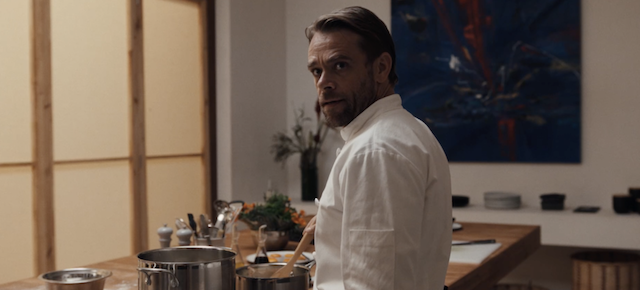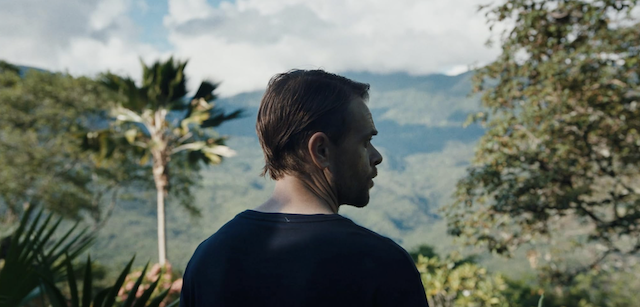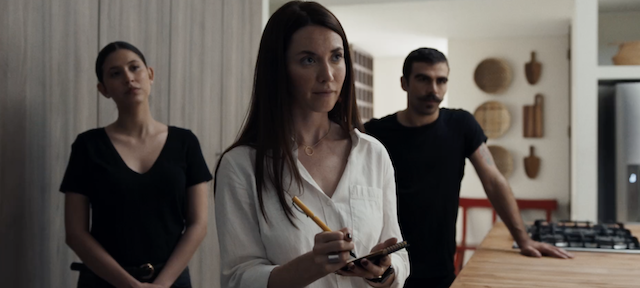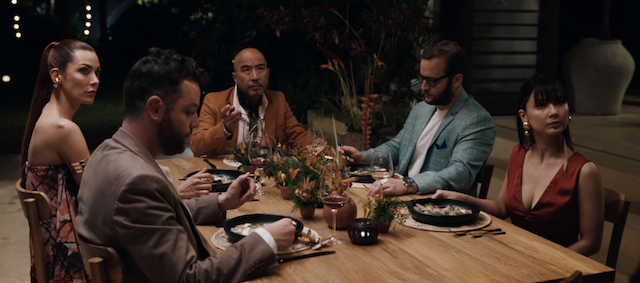
@Courtesy of Magnet Releasing
What You Wish For : Ryan (Nick Stahl) is a talented, down-on-his-luck chef with crushing gambling problems. Circumstances being what they are, he leaves town in a hurry for the safe haven of an unnamed Latin American country where his friend Jack (Brian Groh), a more prestigious chef with his own unique troubles, welcomes him into his home. Ryan has no idea how Jack’s able to afford his extravagant lifestyle cooking for the elite in paradise; he doesn’t want to feel envious, yet he can’t help but want this life for himself as well. Soon, a grim twist of fate will give that to him. Ryan assumes his friend’s identity and soon discovers just what Jack’s been doing to maintain the lifestyle he so desperately craved.
Director : Nicholas Tomnay
Producer : Nicholas Tomnay, Kevin Chinoy, Francesca Silvestri
Screenwriter : Nicholas Tomnay
Distributor : Magnet Releasing
Genre : Mystery & Thriller
Original Language : English
Release Date (Theaters) : May 31, 2024, Limited
Runtime :1h 41m

@Courtesy of Magnet Releasing
Exclusive Interview with Actor Nick Stahl and Director Nicholas Tomnay
Q: This film was a really immersive viewing experience for me, just like your previous film, The Perfect Host, in this film, A main character Ryan doesn’t really know who these people that he’s met except Jack, the audience start to have the guessing game throughout the film, how did this concept get started?
Nicolas Tomnay: I had the idea about a character who doesn’t want to be in his own life and has an opportunity to take on the identity of somebody else and regrets it for a while. I tried out a few different versions of this story. This thing just came together after a school reunion when I saw some old friends of mine from Sydney, Australia, where I’m from. It was a fairly disastrous trip and was just the idea of who we were then versus now. That was the spark and then it was just piece by piece, figuring out how this story could work with two old friends.
Q: How about you, Nick? What was the element in the script that you found fascinating?
Nick Stahl: I just thought it was a really clever thriller and liked the Ryan character right away. I thought it had great twists and turns in the story and doesn’t really go where you think it might [go].
Q. Are there agencies like this one to set up the dinner party for rich clients as in this film? Is there an organization that exists that you got the idea from or did you just come up with the original idea for this one?
Nicolas Tomnay: The idea came from when I was constructing the film and figuring out what the dinner would be and what was the reality that this guy was jumping into that he didn’t want to be in. I figured it was going to be this, and who they were going to be serving this dinner to.
I started thinking that this film was tied into the idea of late stage capitalism — where we are now — and as capitalism progresses, the more people get wealthy and, sorry, but fewer people are getting wealthy so more will get less.
With the very, very wealthy, I started thinking, “Well, what did the very wealthy do, how would they spend their time? They’ve already made all this money.” It occurred to me that novelty is a big deal with very wealthy people. So no, it’s not actually based on anybody or anything, but it’s the conclusion that I drew [from what’s going on].

@Courtesy of Magnet Releasing
Q: Nick, this character, Ryan, has a gambling debt, and it has put him under a lot of pressure. For his next assignment, he’s serving a very special meat to the rich people. Talk about the conversation you had with Nicholas about creating tension throughout the film with your characters.
Nick Stahl: I don’t know how much we talked about creating tension with the character. There’s definite chapters in the story. What Ryan is going through, he’s in this really horrible situation in the beginning. He’s definitely running away from this problem and hiding out.
The story takes a dark turn, but it presents Brian with an opportunity, which what she sees is, you know, and I think all, most of the tension and, and, you know, the, these you know, that it was all built into the, to the, to the great script that Nick wrote. So you know, so, so to me, it was always very clear, like I just needed to show up in the, in the, the role was really there on the page for me.
Q: Nicholas, before the casting process, did you already have a cast in mind when you were writing the script — with Nick Stahl as the star of the film? What was the casting process like, particularly with the Imogen and Maurice characters?
Nicolas Tomnay: I didn’t have anybody in mind when I wrote the scripts. I just wrote the story out and felt like these characters would be the characters. Then, it was a daunting process to think, “Okay, so who’s going to play all these roles.” Obviously, Ryan was the first person that we wanted to cast.
I know Nick’s only heard this now, but genuinely, once I started looking at Nick’s work, I got really excited and was really pleased when you [Nick] said yes. I was looking at his work and I felt like I can only go on my limited experience, but I believe that in order for an actor to work in a role, there must be some element of effortlessness where they’re not pushing against their nature.
It’s not necessarily that they are that character, but they’re not pushing against their own nature [in playing him]. When I saw Nick’s more recent work in particular, I really felt like, “Oh, I could see him doing this.” Then, once we offered it to Nick and he had agreed to do it, we had a casting director who sent out the roles to a whole bunch of different people. The actors in the film are from lots of different places.
There are some from Latin America. Imogen is from England. Maurice is sort of murky, vague in where he’s from, but he ended up being cast as a Latin American. We had two different castings, three different casting points. I just saw a bunch of tapes, and then with Tamsin, in particular, she was just so great in those tapes. I was very excited to work with her and honestly, after looking at Tamsin’s tape, I was like, I don’t need to do anything with her. I just have to tell her, she’s just doing it so it was a real pleasure to work with her and all the actors on the film.
Q: This film was shot in Colombia during COVID time. What was it like to bring the whole crew to shoot there? And for Nick, what was it like shooting with that beautiful scenery in the background?
Nick Stahl: Filming during COVID was challenging for everybody with all the masks, testing and all this stuff. It was no different down there than it was anywhere else. Most of the crew were local Colombians. It was just amazing to go down there. Such a beautiful place and such nice people. We had a really hard working crew of people who were amazing hosts for us.

@Courtesy of Magnet Releasing
Q: How about you, Nicholas? Would you like to bring all the crew over there to shoot there?
Nicolas Tomnay: We had a great production services company we were working with, and they were really committed to make the film the way that we wanted to do it, and with the budget that we had. I found it a little challenging because I was trying to create a very detailed film in terms of the art direction.
I think maybe my communication wasn’t as good as it could have been sometimes. I think people thought I was a bit crazy [while] trying to get everything together. Like Nick was saying, everybody was all in on doing the film. I was very happy to be there.
Q: This film balanced out the music and silence. How did you work with composer Jeff Russo and Tracy Turnbull to create that tension? Talk about getting that balance.
Nicolas Tomnay: I feel like music is the soul of a film. It’s a dance with what’s happened already, but it also informs an audience emotionally about how to respond to the film that’s in front of them. If it’s wrong, you really notice it. When it’s right, hopefully you don’t notice it. You lose yourself in the movie working with Jeff and Tracy. They put together a couple of cues of different directions that the film could take.
I thought one of them was just so interesting and right. I guess it was offbeat in terms of what was expected. I felt like that’s what this film was as well. That process of working with them was extremely rewarding and exciting, especially with Tracy. This is her first film as a composer. She’s been an orchestrator in Hollywood and worked on huge 200 million productions. She’s a massively successful orchestrator, but this is her first project as a composer.
She was very keen to do it. I’m sure she’s always keen to do great work, but she was certainly doing great work with me. It was really a process of her and Jeff doing work, and me giving them notes and going back and forth. We discussed my feelings on silence. Sometimes a film can have wall to wall music, and it’s great. It can work like at the end of, say, Requiem for a Dream.
That’s an exceptionally good example of where really strong music can aid the conclusion of a film. It can work brilliantly. There are other times when music is telling us too much about how we should feel. Sometimes, it can dilute the suspense. Sometimes, silence is the most suspenseful thing. In this film, we did that a little bit. I’m not sure if I took it too far, but we did. There’s a particular moment where you would expect silence instead of music and we have dead silence. Maybe that’s interesting.
Q: Nick, you didn’t have that much time to prepare between the last project and this one. What kind of bonding did you have with cast members to create this?
Nick Stahl: The cool thing about filming this was that we were living in houses together. We were out in the mountains filming outside of the city; we weren’t staying in hotels. The house in the film where the actors, director, and producers were living is on the same street, the same block with neighboring houses. I got to share a house with Maurice and Detective Ruiz as well. We were shacking up together. It was really fun. We all got to know each other and got to hang out and work out together.
Q: Were there any challenging scenes to shoot while you were on set?
Nicolas Tomnay: The idea is that the character Jack has this really terrible car and it breaks down constantly. We actually got a real one and, because of circumstances later in the film, we had to buy it rather than rent it. We actually found this car and this dude in Bogota and bought it. As is depicted in the movie, it was unreliable in real time too. There were actually quite a few moments where the whole crew had to have ropes and harnesses pulling that car along while Nick was inside. I forgot about that.
Check out more of Nobuhiro’s articles.
If you like the article, share your thoughts below!
Here’s the trailer of the film.

